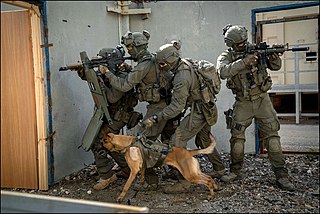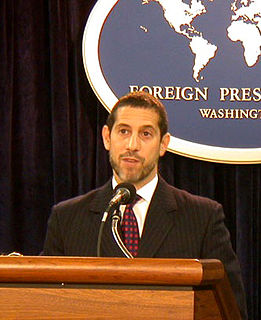Related Research Articles

Terrorism is, in the broadest sense, the use of intentional violence for political or religious purposes. It is used in this regard primarily to refer to violence during peacetime or in the context of war against non-combatants. The terms "terrorist" and "terrorism" originated during the French Revolution of the late 18th century but gained mainstream popularity in the 1970s during the conflicts of Northern Ireland, the Basque Country and Palestine. The increased use of suicide attacks from the 1980s onwards was typified by the September 11 attacks in New York City and Washington, D.C. in 2001.

Counter-terrorism, also known as anti-terrorism, incorporates the practice, military tactics, techniques, and strategy that government, military, law enforcement, business, and intelligence agencies use to combat or prevent terrorism. Counter-terrorism strategy is a government's plan to use the instruments of national power to neutralize terrorists, their organizations, and their networks in order to render them incapable of using violence to instill fear and to coerce the government or its citizens to react in accordance with the terrorists' goals.

Richard Alan Clarke is an American former government official. He was National Coordinator for Security, Infrastructure Protection, and Counter-terrorism for the United States between 1998 and 2003.

An insurgency is a violent, armed rebellion against authority when those taking part in the rebellion are not recognized as belligerents. An insurgency can be fought via counter-insurgency warfare, and may also be opposed by measures to protect the population and by political and economic actions of various kinds, as well as propaganda aimed at undermining the insurgents' claims against the incumbent regime. As a concept, insurgency's nature is ambiguous.
Michael F. Scheuer is an American former intelligence officer for the Central Intelligence Agency, blogger, author, commentator and former adjunct professor at Georgetown University's Center for Peace and Security Studies. One assignment during his 22-year career was serving as Chief of the Bin Laden Issue Station from 1996 to 1999. He also served as Special Advisor to the Chief of Alec Station from September 2001 to November 2004.
Brian Michael Jenkins is an American expert on terrorism and transportation security. During his nearly four decades of analysis, Jenkins has advised governments, private corporations, the Catholic Church, and the Church of England on terrorist threats.
Seth G. Jones is an academic, political scientist and author. Jones is most renowned for his work on counterinsurgency and counterterrorism; much of his published material and media presence relates to US strategy in Afghanistan and Pakistan, and in confronting al Qa'ida. He is currently a Fellow and Director at the Center for Strategic and International Studies (CSIS)

David John Kilcullen FRGS is an Australian author, strategist, and counterinsurgency expert who is currently the non-executive Chairman of Caerus Associates, a strategy and design consulting firm that he founded. He is a professor at Arizona State University and at University of New South Wales, Canberra.

Malcolm Wrightson Nance is an American author and media commentator on terrorism, intelligence, insurgency, and torture. He is a former United States Navy Senior Chief Petty Officer specializing in naval cryptology.
Several scholars have accused the United States of involvement in state terrorism. They have written about the US and other liberal democracies' use of state terrorism, particularly in relation to the Cold War. According to them, state terrorism is used to protect the interest of capitalist elites, and the U.S. organized a neo-colonial system of client states, co-operating with regional elites to rule through terror. This work has proved controversial with mainstream scholars of terrorism, who concentrate on non-state terrorism and the state terrorism of dictatorships.

Salafi jihadism or jihadist-Salafism is a transnational religious-political ideology based on a belief in "physical" jihadism and the Salafi movement of returning to what adherents believe to be true Sunni Islam.
Critical terrorism studies (CTS) applies a critical theory approach rooted in counter-hegemonic and politically progressive critical theory to the study of terrorism. With links to the Frankfurt School of critical theory and the Aberystwyth School of critical security studies, CTS seeks to understand terrorism as a social construction, or a label, that is applied to certain violent acts through a range of political, legal and academic processes. It also seeks to understand and critique dominant forms of counter-terrorism.

Bruce Hoffman is a political analyst specializing in the study of terrorism and counterterrorism, insurgency and counter-insurgency.
Randolph Post “R.P.” Eddy is an American businessman, investor, author, former US government official, and former United Nations senior diplomat. He is the CEO of Ergo, a strategy and geopolitical intelligence firm headquartered in New York. He is also the CEO of Four Rivers, an investment firm focusing on Asia. Eddy and Richard Clarke are co-authors of a best selling and award winning book on forecasting and decision-making, published by HarperCollins. Eddy was named by Foreign Policy Magazine as one of America's most authoritative terrorism and national security experts, Harvard Business Review heralded his business innovations as a "radical new model," and PBS, CNN, Fox and others refer to him as an expert on international affairs, transnational issues, and corporate risk.

The Global Center on Cooperative Security is an independent, nonpartisan, not-for-profit research and policy institute based out of offices in New York, Washington D.C., and London. The Global Center works to improve multilateral security cooperation through policy research and issue-area projects throughout the world.
Due to the convenience, affordability, and broad reach of social media platforms such as YouTube, Facebook and Twitter, terrorist groups and individuals have increasingly used social media to further their goals, recruit members, and spread their message. Attempts have been made by various governments and agencies to thwart the use of social media by terrorist organizations.
Terror groups take to social media because it’s cheap, accessible, and facilitates quick access to a lot of people. Social media allow them to engage with their networks. In the past it wasn’t so easy for these groups to engage with the people they wanted to whereas social media allows terrorists to release their messages right to their intended audience and interact with them in real time. "Spend some time following the account, and you realize that you’re dealing with a real human being with real ideas- albeit boastful, hypocritical, violent ideas". Al- Qaeda has been noted as being as being one of the terror groups that uses social media the most extensively. "While almost all terrorist groups have websites, al qaeda is the first to fully exploit the internet. This reflects al Qaeda’s unique characteristics."
Konrad Kellen was a German-born American political scientist, intelligence analyst and author.

Defeating ISIS: Who They Are, How They Fight, What They Believe is a non-fiction book about counterterrorism against ISIS. It was written by Malcolm Nance, a former cryptology analyst, with a foreword by Richard Engel. Its thesis is that ISIS is not part of Islam, instead, it functions as a separate destructive extremist group. He emphasizes the fact that the majority of those who have been harmed by ISIS are themselves Muslim. The book traces the history of the movement back to the history of Al-Qaeda in Iraq, and it also discusses ISIS's combat style and recruiting tactics. Nance offers a four-point plan to defeat ISIS, including airpower and special forces, Internet tactics, strengthening the Syrian military, and engaging Arab world states.

The Terrorists of Iraq: Inside the Strategy and Tactics of the Iraq Insurgency 2003–2014 is a non-fiction book about the Iraqi insurgency, written by U.S. Navy retired cryptology analyst Malcolm Nance. It was published by CRC Press in 2014. The book discusses the terrorist evolution of the Iraqi insurgency which led to the formation of Islamic State of Iraq and the Levant (ISIS). Nance cites the 2003 Iraq war by the Bush Administration for causing regional instability. He criticizes Coalition Provisional Authority leader Paul Bremer. The book emphasizes lessons the U.S. neglected to learn from the Vietnam War, the Iraqi revolt against the British, and the South Lebanon conflict. Nance writes in favor of the Iran nuclear deal framework by the Obama Administration, saying it is in the interests of all parties involved.

Terrorist Recognition Handbook: A Practitioner's Manual for Predicting and Identifying Terrorist Activities is a non-fiction book about counterterrorism strategies, written by U.S. Navy retired cryptology analyst Malcolm Nance. The book is intended to help law enforcement and intelligence officials with the professional practice of behavior analysis and criminal psychology of anticipating potential terrorists before they commit criminal acts. Nance draws from the field of traditional criminal analysis to posit that detecting domestic criminals is similar to determining which individuals are likely to commit acts of terrorism. The book provides resources for the law enforcement official including descriptions of devices used for possible bombs, a database of terrorist networks, and a list of references used. Nance gives the reader background on Al-Qaeda tactics, clandestine cell systems and sleeper agents, and terrorist communication methods.
References
- ↑ Joshua Sinai (November 20, 2006). "Effective counterterrorism". The Washington Times. (Opinion piece.)
- Gartenstein-Ross, Daveed (2008). "Unconquerable Nation: Knowing Our Enemy, Strengthening Ourselves (Book review)". Middle East Quarterly. Archived from the original on 2016-04-19.
- Lorraine, Nancy (2009). "Chickasaw Unconquered and Unconquerable (Book review)". MBR Bookwatch. Archived from the original on 2015-09-24.